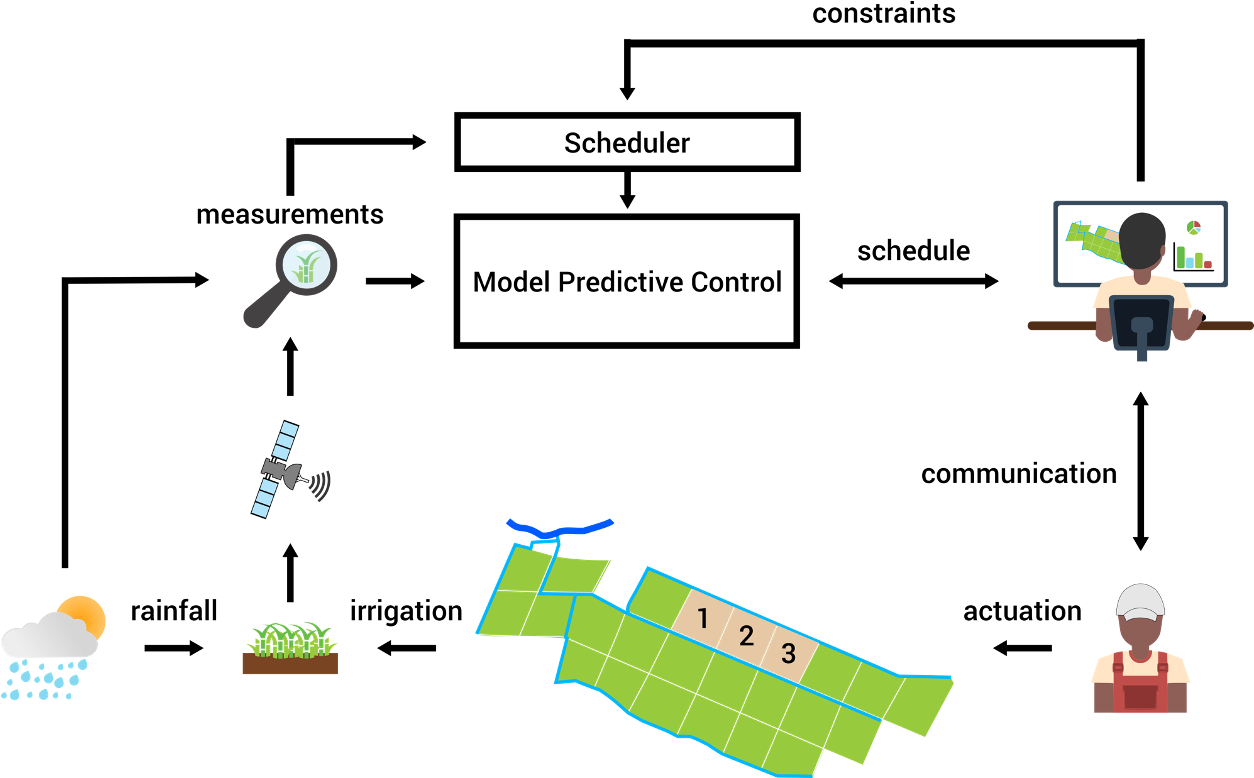Optimal Control for Precision Irrigation of a Large‐Scale Plantation
Tailored Agro-Hydrological Models and Optimisation Approaches for Irrigation Control
Based on recent trends, water stress is likely to increase globally with climate change. At the same time, the world need to produce more food for a growing population with more meat-based diets. Therefore, irrigated agriculture will play a bigger role in the future, especially in regions like sub Saharan Africa where rain-fed agriculture is currently predominant. Increasing water productivity of irrigated agriculture is therefore vital for a food secure future. As consortium partners in the RVO funded IWACA-TECH project, we develop models and advanced control strategies for precision irrigation, to enable the management of water use efficiency utilising data from multiple data sources (in-situ and remote sensing based soil moisture, weather and canopy cover data sources.)
In our work, we consider the general problem of optimal soil moisture regulation for multiple network fields (e.g., a plantation connected with drainage and water supply infrastructure) for a full growth season. It is also important that allocating water optimally over the growth season is considered together with daily irrigation scheduling for multiple fields to explicitly hedge against uncertainties in rainfall. This adds complexity to the management problem, as operational constraints need to be included (such as a limited number of fields that can be irrigated in a day, water distribution and pumping constraints) and trade-offs need to be made between irrigation and input costs and potential yield of the different fields. Furthermore, the growth stages of the fields can be different, as often not all fields can be planted and harvested at the same time.
 Figure: Leveraging In-Situ and Remote Sensed Data, Systems Theory and Numerical Optimisation for Smart Irrigation
Figure: Leveraging In-Situ and Remote Sensed Data, Systems Theory and Numerical Optimisation for Smart Irrigation
To optimally distribute water over the fields, we propose a two‐level optimal model predictive control approach, where seasonal water allocation and daily soil moisture regulation are dealt with. Our tailored convex approximations allow the fast solution of water allocation problems with Mixed Integer Linear Solvers. To reduce the computational complexity of the daily controller, a mixed‐logic dynamical model is identified based on the AquaCrop‐OS model simulations and remotely sensed data. This dynamical model incorporates saturation dynamics explicitly to improve model quality. To further improve performance, we create an evapotranspiration model by considering the expected development of the crop over the season using remote‐sensing‐based measurements of the canopy cover. The performance of the two‐level approach is evaluated through a closed‐loop simulation in AquaCrop‐OS of a real sugarcane plantation in Mozambique. Our optimal control approach is shown to boost water productivity by up to 30% compared to local heuristics and can respect water use constraints that arise in times of drought.
Research outputs
Kassing, R. C., B. De Schutter, and E. Abraham. “Optimal Control for Precision Irrigation of a Large‐Scale Plantation.” Water Resources Research (2020): e2019WR026989.
Kassing R, de Schutter B and Abraham E (2020), “Optimal seasonal water allocation and model predictive control for precision irrigation”, In EGU General Assembly Conference Abstracts.
For more details please also refer to Publications.
